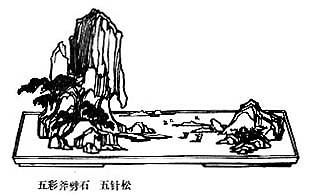36 Ji 
 – Thirty-Six Strategies
– Thirty-Six Strategies
A recently uncovered notebook of 36 proverbs commented as military tactics that helps dealing with conflicts. Tr. Verstappen (en), Doc Mac Jr (fr).
13. Beat The Grass To Startle The Snake
14. Borrow a Corpse to Raise the Spirit
15. Lure the Tiger Down the Mountain
16. To Catch Something, First Let It Go
17. Toss Out A Brick To Attract Jade
18. To Catch the Bandits First Capture Their Leader
36ji III. 15.
Lure the Tiger Down the Mountain
Never directly attack a well-entrenched opponent. Instead lure him away from his stronghold and separate him from his source of strength.
Three Kingdoms Period China
In the year 199, Sun Ce had consolidated his newly conquered territories in the south and his next goal was the prosperous area of Lujiang to the north. However, Lujiang had a professional army and was well defended. In addition it also had the advantage of terrain, being accessible only through a couple of easily defended passes. Sun Ce's advisors cautioned against moving directly against such a well-entrenched and powerful state so they devised another scheme. Sun Ce sent an emissary laden with gifts and a letter to the king of Lujiang, Liu Xun. The letter praised the King's military skills and begged for his assistance. Sun Ce wrote: " For years the state of Shangliao has invaded my territory unhindered and carried away booty, yet we are too weak to launch a retaliatory raid. If Your Majesty would attack Shangliao we would give assistance and you could annex the state for yourself." Flattered and covetous of increasing his domains, The king of Lujiang disregarded the advice of his counselors and attacked the state of Shangliao. Several weeks later, while the king of Lujiang was busy laying siege to Shangliao's capital, Sun Ce attacked the almost undefended Lujiang and easily seized the capital. Without the expected support from Sun Ce, The king of Lujiang failed to take the capital of Shangliao and he returned only to find his own capital already in enemy hands. Sun Ce now had the advantage of the Lujiang terrain and the former king could do nothing but flee with his army.
Verstappen
« Attire le tigre hors de la montagne »
Pousse l'adversaire à déployer
ses meilleurs éléments loin de leur base.
Attendre que le temps épuise l'ennemi et tramer un complot pour l'attirer. Quand avancer amène à l'obstruction, il faut reculer.
Dans un contexte militaire, un tigre dans sa montagne symbolise un ennemi puissant qui jouit de la protection d'une cité fortifiée, d'un camp retranché, d'un col montagneux stratégique ou d'une voie d'eau tumultueuse et sauvage. Celui qui commande une armée disciplinée est averti de ne pas se lancer à l'attaque d'un tel ennemi.
Un proverbe chinois ne dit-il pas :
« Gisant sur le sable, le dragon est importuné par les crevettes,
descendant dans la plaine, le tigre est rudoyé par les chiens. »
Ainsi, que ce soit en vue de l'annexion de territoires ennemis ou de la destruction de ses forces militaires, il faudra s'efforcer d'éloigner l'ennemi de son imprenable position avant d'engager le combat.
Connexion avec la stratégie Trente.
* Tiré de l'hexagramme 39 Jian (l'obstacle) « neuf à la troisième place » : en termes humains il est recommandé d'éviter de se trouver dans un lieu dangereux contrôlé par un adversaire puissant. En temps de guerre, il ne faut pas attaquer un ennemi fort qui occupe déjà une place avantageuse.
Doc Mac Jr

Thirty–Six Strategies – 36 Ji III. 15. – Chinese off/on – Français/English
AliasThirty-Six Strategies, Thirty-Six Stratagems, Secret Art of War, Les 36 stratagèmes, Les Trente-six stratégies
The Book of Odes, The Analects, Great Learning, Doctrine of the Mean, Three-characters book, The Book of Changes, The Way and its Power, 300 Tang Poems, The Art of War, Thirty-Six Strategies
Welcome, help, notes, introduction, table.
Index – Contact – Top
